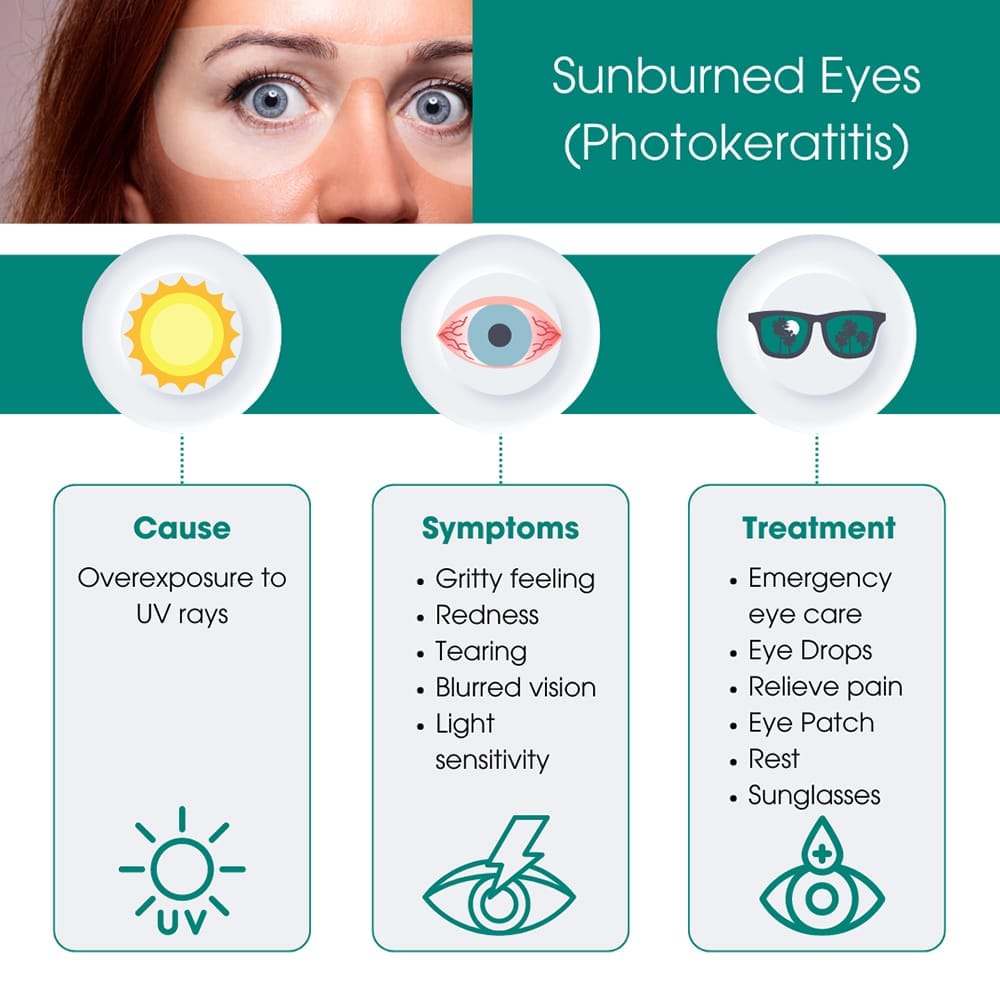Photokeratitis is the technical term for sunburned eyes, which happens when your eyes are exposed to too much ultraviolet (UV) rays from the sun or other sources. Photokeratitis can cause temporary but painful symptoms such as:
If you’re suffering from sunburned eyes or any other eye problems, you need medical attention as soon as possible to prevent further complications. At Eye Physicians in New York, you find a team of experienced optometrists and qualified photokeratitis doctors who treat sunburned eyes and other eye conditions using the latest eye medical technology. They offer personalized treatment and comprehensive eye care to fit the severity of your condition and restore your visual function to the full extent possible.

Photokeratitis is caused by overexposure to UV rays, which can damage the outer layer of the cornea and the conjunctiva, the thin membrane that covers the white part of the eye. UV rays can come from various sources, such as the sun and artificial sources, such as welding arcs, tanning beds, lasers and lamps.
When UV light reaches the eye, it can lead to inflammation, swelling and pain in the cornea and the conjunctiva. This can affect your vision and make the eyes feel gritty, watery and sensitive to light. Some people are more prone to developing photokeratitis than others. The risk factors for photokeratitis include having:
Photokeratitis can cause a range of symptoms that affect the eyes and your vision. The symptoms vary depending on the severity and duration of exposure to UV rays. The symptoms of photokeratitis usually appear after a delay of six to 12 hours following exposure to UV rays, and they can last from six to 24 hours. In most cases, the symptoms are temporary and are resolved within about 48 hours without additional sunburn eyes treatment.
However, some people may experience longer lasting or more severe symptoms, such as corneal ulcer, infection, scarring or permanent vision damage. And if left untreated, severe photokeratitis can lead to long-term complications such as cataracts, macular degeneration and eyelid cancer. In addition to the immediate common symptoms mentioned above, other signs of sunburned eyes include:
Rely on the experience and training of photokeratitis doctors who can properly diagnose sunburned eyes as well. The symptoms often closely mimic other conditions that may require a different set of tests or treatment to restore your vision properly. Conditions that resemble sunburned eyes or share may of the same symptoms include:
Photokeratitis is a temporary condition that usually dissipates within a few days. However, if you don’t seek medical attention or protect your eyes from further UV exposure, you may experience some serious complications.
You could develop a corneal ulcer, which is an open sore on the cornea that can cause severe pain, infection, scarring and vision loss. Other consequences of untreated photokeratitis include:
After a thorough examination of your eyes to assess the extent of the damage, your photokeratitis doctors offer several treatment methods to help you recover from photokeratitis and relieve your symptoms, including:
Eye Physicians in New York know how to treat sunburned eyes best. This leading eye clinic offers comprehensive eye care services, including diagnosis and treatment of photokeratitis and other eye conditions for you and your family. Adult eye specialists and pediatric eye doctors Optometrist offer treatment for conditions such as:
Find relief and sunburn eyes treatment at Eye Physicians in New York, where they offer comprehensive eye care services. Don’t underestimate the disruption photokeratitis can have on your life. Contact Eye Physicians today to schedule an appointment with one of their top photokeratitis doctors.
Eye Physicians
110 Lafayette St, Suite 503
New York, NY 10013
(212) 292-4814
Entrust the care of your precious eyesight to highly skilled and experienced eye care professionals. For top-notch ophthalmologists and optometrists in Downtown Manhattan, choose Eye Physicians. Eye Physicians ensures prompt care, precise diagnosis, and personalized treatment plans.
Schedule an Appointment